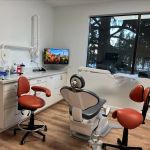How to Handle a Knocked-Out Tooth: Immediate Actions and Care Tips
It's every parent’s nightmare, and a moment of panic for anyone—losing a tooth due to a sudden accident. Whether it's from a fall, a sports injury, or an unfortunate bump, having a tooth knocked out is a situation that demands quick action. I’ve been through this experience myself and can tell you that staying calm and following the right steps can make a huge difference in saving the tooth and preventing future complications. In this article, I’ll walk you through the immediate actions you should take if you or someone else has a tooth knocked out.
1. Assessing the Situation
The first step after a tooth has been knocked out is to stay calm and assess the situation. The initial shock of seeing a tooth missing can be overwhelming, but it’s important to stay focused. Whether it’s an adult tooth or a baby tooth, the response differs slightly. For adults, the tooth is crucial for long-term oral health, so it’s vital to act quickly to give it the best chance of being saved. For children, it’s typically a baby tooth, which doesn't need to be replaced but still requires care.
If the injury is severe, with bleeding from the gums or the mouth, I would recommend seeking emergency medical help immediately. While you’re waiting for professional care, you can help manage the situation and reduce the risk of further complications. Keep in mind that a knocked-out tooth should always be treated as a dental emergency.
2. Retrieving the Tooth Safely
If you can find the knocked-out tooth, it’s crucial to handle it carefully to give it the best chance of being reinserted. Avoid touching the root of the tooth, as this part is delicate and critical for reattachment. Instead, hold the tooth by the crown (the top part that’s visible when it’s in the mouth). If the tooth is dirty, rinse it gently with water to remove any dirt, but do not scrub it or use soap, as this could damage the root tissue.
When I was in this situation, I learned that the best way to preserve the tooth is to keep it moist. If possible, place the tooth back in its socket gently. Have the person bite down on a clean cloth or gauze to help hold the tooth in place until you can get to the dentist. If reinserting it isn't an option, storing the tooth in a glass of milk or saliva is the next best alternative. This helps keep the tissue alive, giving the tooth a chance of surviving the reimplantation process.
3. Why You Should Keep the Tooth Moist
The key to saving a knocked-out tooth is preventing the root from drying out. The root contains living cells, and these cells are crucial for the tooth’s reattachment. I learned this the hard way, and now I always recommend keeping the tooth moist in either milk or saline solution. A tooth that has been kept wet has a higher chance of being successfully reimplanted by a dentist.
If you’re unable to find milk or saline, you can also store the tooth in the victim’s own saliva. I remember using my own saliva to keep a tooth safe when my child lost one. While it might sound a bit unusual, this method is often effective in preserving the tooth’s cells until you get to the dentist.
4. Timing Is Critical: How Quickly Should You See a Dentist?
Timing plays a crucial role in the outcome of a knocked-out tooth. Ideally, you should see a dentist within 30 minutes to an hour of the incident. The sooner the tooth is reinserted into the socket, the better the chances of it surviving and integrating back into the gum tissue. In my experience, even if you can’t make it to the dentist right away, taking the right steps, like keeping the tooth moist, can significantly improve the chances of a successful reimplantation.
If you're unable to get to a dentist quickly, don’t give up hope. The tooth may still be viable up to 2 hours after it’s been knocked out, depending on how well it’s been preserved. If you happen to be in a remote area with limited access to dental care, look for an emergency dental clinic or call a helpline for advice. Many emergency services can guide you on the next best steps to take.
5. What Happens After Reimplantation?
Once the dentist successfully reimplants the tooth, you may be asked to wear a splint or avoid chewing on that side of your mouth for a while. The healing process can take several weeks to a few months, during which time the tooth may require additional care and follow-up visits. It’s also common for the dentist to perform an X-ray to check for any underlying fractures in the bone or root. I’ve had patients who had to be extra cautious during the recovery period, but most of them were able to keep their teeth intact with minimal complications.
During this healing period, your dentist will likely give you pain management options and may suggest specific oral care routines to help the healing process. You might be instructed to avoid using the affected tooth for biting or chewing until the dentist gives the all-clear.
6. Preventing Future Dental Injuries
While it’s impossible to prevent all accidents, there are steps you can take to reduce the risk of dental injuries. Wearing a mouthguard during sports activities is one of the most effective ways to protect your teeth from being knocked out. As a parent, I’ve made sure my kids wear mouthguards while playing basketball and soccer, which has helped prevent dental injuries.
Additionally, teaching children proper safety measures, like avoiding rough play, can also help minimize the chances of tooth-related injuries. The more we can do to prevent accidents, the less likely it is we’ll have to deal with a knocked-out tooth. But in the event that it does happen, having the right knowledge and acting fast can make all the difference.
SEO Title: How to Handle a Knocked-Out Tooth: Immediate Actions for Saving ItSEO Keywords: knocked-out tooth, how to handle a knocked-out tooth, tooth reimplantation, emergency dental care, dental injurySEO Description: Learn how to properly handle a knocked-out tooth to increase the chances of saving it. Immediate actions, reimplantation tips, and dental care advice.






 Uptown Dental4.0 (73 review)
Uptown Dental4.0 (73 review) Gentle Dental Downtown Portland4.0 (123 review)
Gentle Dental Downtown Portland4.0 (123 review) Mary Fares Mallouhi, DDS4.0 (78 review)
Mary Fares Mallouhi, DDS4.0 (78 review) Harmony Dental Health4.0 (259 review)
Harmony Dental Health4.0 (259 review) The Modern Endodontist: Yarah Beddawi DDS | Root Canal Specialist in Mountain View and Los Altos4.0 (200 review)
The Modern Endodontist: Yarah Beddawi DDS | Root Canal Specialist in Mountain View and Los Altos4.0 (200 review) Grzybicki Family Dentistry0.0 (0 review)
Grzybicki Family Dentistry0.0 (0 review) The Importance of Oral Health Education During Pregnancy for a Healthy Pregnancy
The Importance of Oral Health Education During Pregnancy for a Healthy Pregnancy Best Tips for Brushing Your Teeth Properly for Healthy Gums: Essential Techniques for Oral Health
Best Tips for Brushing Your Teeth Properly for Healthy Gums: Essential Techniques for Oral Health Why Skipping Dental Checkups Can Lead to Bigger Oral Health Problems
Why Skipping Dental Checkups Can Lead to Bigger Oral Health Problems Advantages of Porcelain Dental Restorations
Advantages of Porcelain Dental Restorations How Can Diabetes Cause Tooth and Gum Problems? Preventing and Managing Oral Health Issues
How Can Diabetes Cause Tooth and Gum Problems? Preventing and Managing Oral Health Issues Healthy Habits for Promoting Good Oral Health and Hygiene: Tips for a Healthy Smile
Healthy Habits for Promoting Good Oral Health and Hygiene: Tips for a Healthy Smile